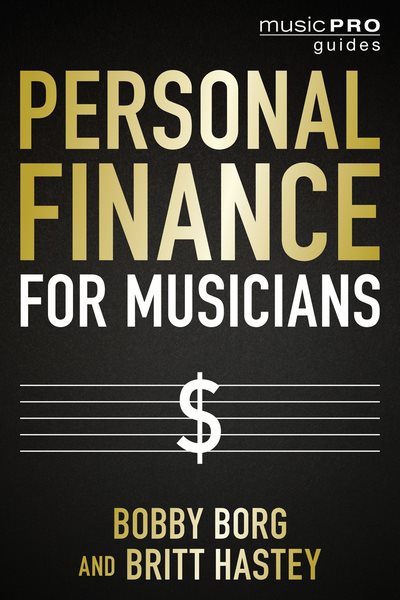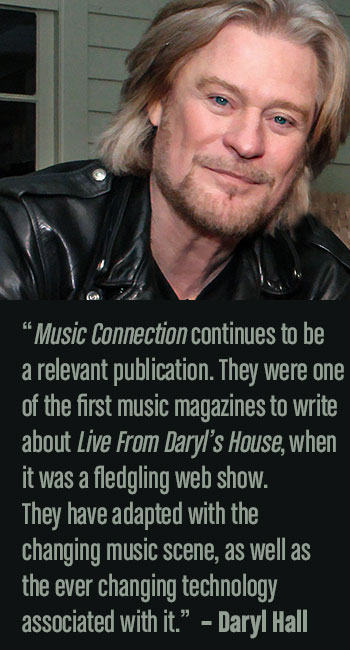By Bobby Borg and Britt Hastey
Identity theft and fraud exists when a less than desirable person gets hold of your personal information, uses it to open new lines of credit, and racks up debt in your name. It also exists when someone uses your info to withdraw money from your existing financial accounts.
While we could go on and on with examples of identity theft and fraud, the bottom line is that it can temporarily ruin your life and good credit standing—and seriously sidetrack your music career. This is why learning a variety of safety precautions to protect yourself from thieves is an important part of personal finance.
What follows are 20 tips—from storing your personal information safely to utilizing identity theft prevention services. There’s a lot of stuff here that can seem a bit overwhelming, so feel free to skim the list to get a general idea of the important steps you can start taking today.
STORE YOUR PERSONAL INFORMATION IN A SAFE PLACE
The first step in protecting your identity is to make sure no one has access to your personal information.
This means securing things like your social security number, credit card number, and bank and retirement account numbers. You can use a secure computer hard drive, file cabinet with locking drawers, or home safe.
Also, be sure to limit to whom you give important information like your date of birth, address, and mother’s maiden name. You can simply keep that information tucked away in your pretty little head. In other words, zip your lips!
Remember, there’s only one of you on this earth. Don’t let someone else try to be you. Protect your personal information like you would the “rights” to your award-winning songs.
SIGN YOUR NEW CREDIT CARD IMMEDIATELY
Signing the box on the back of your credit card immediately upon receipt is great practice in minimizing your chances of identity theft.
To ensure your signature sticks, use a non-erase sharpie pen just like the ones you use to sign autographs for your beloved fans.
Or, if you don’t want to sign your name, simply write, “Check ID” in the signature box on the back of the card. This way, the clerk will ask for your ID each time you make a purchase.
Whichever approach you use, it’s far better than just leaving your credit card blank.
NEVER LET YOUR CREDIT CARD GET OUT OF YOUR SIGHT
Keeping your eyes on your credit card each time you use it is another preventative measure.
Yes, we know this isn’t always possible, like when that server walks away to run your card. But as a general rule, never lose possession or sight of your credit card for more than a couple of minutes.
This means don’t loan out your credit card, don’t leave it at the club because you were too drunk to remember to pay your tab, and don’t leave it with the front desk at the rehearsal studio where you rent space. There are many other examples, but you get the gist! Watch it, or else!

REVIEW CREDIT CARD BILLS TO ENSURE TRANSACTIONS ARE YOURS
Though it can be time consuming, looking at your monthly credit card statements is plain smart. People usually don’t find out about illegal charges until they’ve reviewed their statements. And for those who never look at their statements, they end up paying for purchases that are not even theirs. Do you really want to pay for three rounds of drinks you never drank? Nope!
Look, when credit card companies are alerted of dispute charges early enough, they may remove it from your account and not hold you liable. So, always inspect to protect!
ASK FOR ALL YOUR RECEIPTS
Ask, ask, ask! Having receipts as documentation for your purchases is a great way to protect yourself from theft.
Since most of us can’t remember all our purchases or recognize transaction names on our statements, you’ll now have receipts as a reference. If there’s a charge on your credit card that you can’t match to a receipt, you may be the victim of fraud. OUCH! Should this happen to you, notify your credit card company immediately and dispute the charge.
BE CAREFUL USING ATMS
Cash is king. And sometimes you need a little of it in your pockets. But just remember that ATMs are hotspots for identity thieves.
So, the next time you visit an ATM, keep the following tips in mind:
•Look for suspicious skimming devices on the front of the ATM
•Do not use ATM machines that look jank or have shifty keypads or card slots
•Never leave your ATM receipts behind. And finally…
• Watch for people looking over your shoulder
Bottom line, use common sense when using ATMs, and you just might thwart the thieves!
UPDATE ALL YOUR ONLINE PASSWORDS
Okay, we know…it’s a pain in the ass keeping track of all your passwords. But making sure your passwords are fresh and newly updated is one of the best fraud prevention techniques out there.
To minimize fraudulent access to your online accounts, create strong passwords with random letters, numbers, and symbols. Just never use words, names, or phrases that can be easily connected to you. For instance, don’t use your personal name or band name for one of your passwords. While this might sound like common sense, remember that sense is not always common. Okay! Now. Let’s move on!
INSTALL SOFTWARE THAT DETECTS SPYWARE AND OTHER VIRUSES
One of the sneakiest ways thieves can obtain your personal information is through the internet.
Therefore, always install antivirus and anti-spyware software on your computer. For a small subscription charge, you can get top-rated products by Norton, Bitdefender and McAfee.
Warning: Criminals posing as legit websites commonly offer free giveaways of “antivirus” protection software in hopes that your greed will get the best of you. Should you fall for this and download their free product, spyware may be installed on your computer. So, be mindful of everything that you download from the internet, or you could end up regretting it.
ACTIVATE TWO-STEP AUTHENTICATION ON YOUR ACCOUNTS
Since criminals can easily crack one online password, it makes sense to activate two-factor authentication (2FA).
2FA is an extra step added to the log-in process, such as a code sent to your phone, that helps verify your identity. It offers an extra level of security that cyber-thieves can’t easily access.
Typically, sites that offer 2FA will ask you to activate it every time you log on. Other sites, like the college where I work (this is Bobby), will insist you sign up for it, or you won’t be able to log on. Ha ha. I guess this is my college’s way of using tough love to cause change.
BE CAREFUL WHEN USING PUBLIC COMPUTERS
Be careful when using public computers in libraries, schools, and hotel business centers, especially when logging on to your business and financial accounts.
Personally, we’d recommend not using public computers at all for business use. But when you’re out on the road with your band and you have no other options, at least do the following:
• Log off of every account you visit
•Don’t allow the computer to save your login information
• Delete your history
• Watch out for over-the-shoulder snoops
•Never leave the computer unattended while logged on to an account. And finally…
• Never enter any sensitive information
By practicing these few tips, you’ll keep your info safe and keep the thieves away.
DON’T FALL FOR PHISHING AND OTHER SCAMS
Don’t fall for phishing and other scams that are devised by criminals to catch you off guard.
With a phishing scam, you’ll typically receive an email with an internet hyperlink that directs you to a criminal website that contains fields for you to enter your personal information.
To protect yourself against phishing scams, follow these six tips:
• Ignore outrageous or overly urgent emails
•Be extra cautious of people asking for personal information
•Do not open attachments you are not expecting, no matter who it is from
• Avoid clicking on embedded email links
•Watch for suspicious emails even when they appear to be from a friend. And finally…
•Be wary of emails with improper grammar/spelling and shoddy graphics
Remember folks, if you happen to fall for a phishing scam, the hacker will be “gone fishing” with your personal information. So don’t let this happen to you. Enough said!
PURCHASE ONLY FROM SECURE SITES (HTTPS://)
Purchasing from sites that begin with https:// is another smart way to beat the fraudsters.
Sites using this protocol are secure and on a legit server.
So before whipping out your credit card on your next online purchase, heed our advice.
WIPE (OR DESTROY) ALL ELECTRONICS BEFORE PARTING WITH THEM
Taking extra precautions before selling, trading in, or disposing of electronics is also a good bet in helping you secure sensitive data.
When selling or trading in electronics, always wipe your computer hard drive and phone’s SIM card. If you don’t know how to do this, have an expert assist you.
When disposing of electronics, drill holes through your computer hard drive and smash your phone’s SIM card, as well. Hell, blow them up for all we care!
This one is a no brainer. So, just do it!
CHECK YOUR CREDIT HISTORY FOR SIGNS OF FRAUD
Checking your credit history for signs of fraud is something you should do on an ongoing basis. This is often overlooked, and thieves know this.
You can obtain a free credit report from annualcreditreport.com once per year and purchase additional statements throughout the year from the three major credit bureaus, Equifax (equifax.com), Experian (experian.com), and TransUnion (transunion.com).
A good rule of thumb is to get your free report in January, and then pay for the others in April, July, and October. While some people may think this is over-kill, we say it’s just smart!
FREEZE YOUR CREDIT SO FRAUDSTERS CANNOT OPEN ACCOUNTS
If you are not planning on opening new accounts or applying for new loans in the immediate future, then you may want to freeze your credit by calling the three credit bureaus.
A credit freeze prevents unauthorized persons from opening credit in your name, and also blocks creditors from checking your credit profile. You really can’t get any safer than this.
Just don’t forget you’ll have to unfreeze your credit (or unthaw it) should you ever decide to apply for new lines of credit. All this requires is a simple call to the credit bureaus. That’s it!
REQUEST ZERO CREDIT CARD SOLICITATIONS AND JUNK MAIL
Opting out of credit card solicitations and junk mail is also a good idea in protecting you from potential fraudsters. Someone could steal one of your credit card offers and attempt to open a card. Or you might fall for some silly junk mail offer and end up getting scammed.
So, to cover your ass, follow these three steps below:
•Call The Consumer Credit Reporting Agency to opt out of new credit card offers. There number is 1-888-5optout (1-888-567-8688)
•Send a letter to: Direct Marketing Association to opt out of junk mail offers. Their address is: Attention Mail Preference Service. P.O. Box 9008. Farmingdale, NY 11735-9008. And finally…
•Contact DMAChoice in an additional effort to set preferences for what you want to receive in the mail. Their website is https://www.dmachoice.org/static/learn_more.php
Just don’t be surprised if you still receive solicitations after going through these processes. But remember, anything you do to get rid of these annoying solicitors (even if just a few), is better than doing nothing at all.
PROTECT YOUR INCOMING MAIL
Probably one of the easiest ways to protect yourself against identity theft and fraud is to protect your incoming mail from lurking thieves. That’s right!
Mail theft has been on the rise, especially after the 2020 COVID pandemic that changed the world. People got used to having everything delivered to them via Amazon and the United States Postal Service, and thieves have been jumping all over this opportunity to rip you off.
So, be sure to follow a few or all of these simple tips:
• Retrieve your mail ASAP after delivery
•If leaving town (i.e., touring) inform your post office to hold your mail
•Report suspicious activity around your mailbox to the police
•Get a Ring Doorbell Cam for renters or home owners. And finally…
•Get a post office box at the Post Office or The UPS Store
Look, the last thing you want to do is have thieves get a hold of any important packages or letters that contains sensitive personal information inside. It’s yet another way they can steal your identity and fuck up your credit. Not to mention humiliate you. So, take this tip seriously.
MAIL BILLS AT THE POST OFFICE ONLY
We know it’s a pain in the ass, but consider using the Post Office exclusively for outgoing mail, especially those pieces that contain sensitive information.
I (this is Bobby) actually got a few checks stolen from the mail when thieves ripped the entire USPS metal mailbox right out of the cement. Can you believe that? Fortunately, I noticed the missing mailbox just after the incident took place, and made the decision to cancel my checks before they could be cashed. Of course, now, I mail everything from my neighborhood Post Office.
So, make no mistake, simply leaving sensitive outgoing mail in your mailbox is recipe for both mail and identity theft. Take care. Don’t let this happen to you!
BUY A PAPER SHREDDER AND SHRED IMPORTANT “TRASH”
Stop throwing away important information in your trash. This includes credit card offers, deposit slips, bank checks and statements, canceled checks, and medication or prescription receipts.
Instead, get yourself a paper shredder from Staples or Office Depot that crosscuts your information (not strip cuts). This is the best way to protect yourself against dumpster-diving thieves. You know that “so-called” transient who is searching for bottles to recycle? Think again!
Yup, trashing important info is like feeding hungry sharks.
USE A SECURITY MONITORING SERVICE (LIKE LIFELOCK)
Finally, a secure way to help prevent identity theft is to use a security monitoring service.
While we do like LifeLock, some other security monitoring services are Aura, Identity Guard, and Identity Defense, just to name a few.
These services range from credit monitoring to data recovery and offer multi-layer protection for your personal information. They even have insurance of up to $1 million.
So, do yourself a favor and let others watch your back, 24/7. This could pay off big-time.
Okay, so that concludes our 20 tips to protecting yourself against identity theft and fraud. Since identity theft and fraud can temporarily ruin your life and good credit standing, we highly recommend that you practice as many tips as possible. Even if you can practice just a few, you’ll be far ahead of most musicians. So, what do you say? Get to work at protecting yourself today!

Personal Finance For Musicians
is available in physical and digital form on Amazon and other fine book sellers.
BOBBY BORG, MCM is a former recording/touring artist, founder of Bobby Borg Consulting, and author of Music Marketing For The DIY Musician, Business Basics For Musicians, and Intro to Music Publishing. He is also a music industry professor at USC’s Thornton School of Music.
BRITT HASTEY is the Department Chair of the Business Administration Department at Los Angeles City College. He is also an adjunct professor at Chapman University, University of Massachusetts, and UCLA where he teaches Personal Finance.















